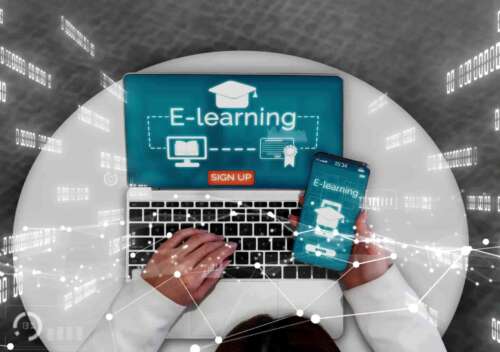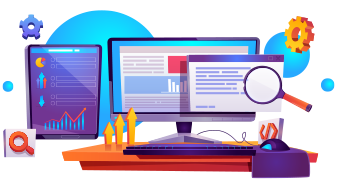Determining business success with CRM software Integration to LMS Systems. Helping you know the various benefits of this integration
Use the Benefits of CRM software Integration to LMS Systems for Better Customer Services
In today’s dynamic business landscape, the adoption of Customer Relationship Management (CRM) systems has become ubiquitous across businesses of all sizes. Simultaneously, eLearning and Learning Management Systems (LMS) have emerged as indispensable tools for online learning. This has given space to a new trend of CRM software integration to LMS system for enhancing and improving customer relationship.
While there is a plethora of CRM and LMS options available, the focus has shifted towards integrating LMS with CRM systems. But why is this integration so crucial? What benefits does it offer businesses? In this blog post, we delve into the fundamental distinctions between CRM and LMS, the significance of integrating LMS with CRM, and the myriad benefits it brings to companies.
Let’s explore!
What is CRM Software Integration?
CRM software integration refers to the process of connecting a CRM system with other software applications to create a unified ecosystem that enhances business operations. This integration allows businesses to leverage the full potential of their CRM software and maximise its benefits.
One of the key benefits of CRM software integration is improved efficiency. By integrating CRM with other systems, businesses can automate repetitive tasks, streamline processes, and reduce manual data entry. This not only saves time but also allows employees to focus on more strategic tasks that can drive business growth.
What are the Benefits of CRM?
From a list of benefits that CRM integration offers to a business, the following are most crucial:
- Implementing a CRM system empowers organisation to streamline communication throughout the entire product lifecycle, reducing the burden of administrative tasks and promoting an organised, efficient operational framework
- The integrated reporting feature enables higher education professionals to effortlessly monitor progress and make informed strategic adjustments
- By alleviating the administrative workload, more time becomes available for generating quality content and executing impactful communication strategies, such as personalised, automated email marketing campaigns during various stages of the admissions process
What is LMS development and its Benefits?
A Learning Management System (LMS) is software designed to create, store, manage, and distribute instructional content within a business. It operates on a “top-down” instructional method, where students follow predetermined paths created by administrators, allowing them to work at their own pace.
The LMS development applications and benefits are vast, catering to various needs and goals of a business. Commonly, businesses use LMS for efficient content distribution, staff training, and onboarding processes. It simplifies training and development tasks by aiding in setting and analysing individual and organizational learning objectives, tracking progress, and summarizing learning outcomes. Additionally, an LMS can manage compliance, conduct skills gap analyses, and facilitate onboarding procedures.
Overall, an LMS can significantly enhance the effectiveness and accessibility of training, while also reducing costs and delivery times.
LMS Vs CRM: Why This Integration is Essential for Business?
By harnessing the capabilities of Customer Relationship Management (CRM) systems to gather and store extensive customer data, businesses can unlock a multitude of benefits. CRM integration with Learning Management Systems (LMS) presents a powerful opportunity to drive sales revenue, reduce customer turnover, and foster sustainable business growth. Here are more benefits that come along with this integration:
Deliver learning experience personalised to user’s needs
Providing customers with personalised learning experiences can make all the difference. By leveraging the expertise of the marketing department, businesses can offer tailored learning recommendations to customers. Through enrolling in these specialised training programs, customers can deepen their understanding of the company’s products, services, and values with minimal assistance or support required.
Cross-selling and Upselling benefits
In the realm of modern sales strategies, e-learning courses have emerged as powerful tools for sales representatives. These courses not only provide valuable insights and knowledge but also offer avenues for cross-selling and upselling opportunities. By gaining a deeper understanding of the products or services through e-learning, sales reps can effectively identify additional products or services that complement the customer’s needs, thereby increasing sales revenue.
Reduced repetitive queries
In customer support practices, knowledge is power. When customer support representatives have an in-depth understanding of your company, its products, and its services, they can address customer inquiries more efficiently and effectively. By being well-versed in the intricacies of your offerings, customer support can provide comprehensive and accurate information, reducing the need for customers to ask repetitive questions.
Enhanced skill to ensure hands-on experience
Today’s digital age ensures the value of knowledge-sharing extends beyond internal training sessions. The insights gained from these training sessions can be invaluable for members, clients, and business partners within a Customer Relationship Management (CRM) system. For example, offering courses that detail the capabilities of a product allows consumers to access their CRM accounts and experience each function first-hand.
Automatic enrolment
Incorporating Customer Relationship Management (CRM) data into the enrolment process can streamline operations and enhance user experience. Business going for CRM software integration can help leverage CRM information. With this business can automate the enrolment process, starting with the creation of personalized email templates. These templates include login instructions and direct links to the learning platform, simplifying the user onboarding process.
Single sign-in for login
Implementing a unified sign-on system for both Customer Relationship Management (CRM) and Learning Management System (LMS development) can significantly enhance user experience and streamline operations. By allowing users to access both systems using a single set of credentials, businesses can eliminate the need for users to switch between screens, saving time and reducing frustration.
Advantages of LMS in Customer Relationship Management
While learning management systems (LMS) can operate as standalone software, their full potential is often underutilised in isolation. Integrating an LMS with Customer Relationship Management (CRM integration) software through API (Application Programming Interface) can unlock a host of strategic benefits for your organization, particularly in sales.
Here is an extended account on the benefits of LMS in Customer Relationship Management:
Improved learning experience
Utilising a single sign-on procedure, users benefit from seamless access across both software platforms, as user data and permissions are shared between them. This integration enhances the learning experience by providing students with immediate access to the program and the ability to apply their newfound knowledge in real-world scenarios.
This approach not only makes the learning process more exciting and engaging but also enhances its effectiveness. As students apply what they have learned in practical settings, they gain a deeper understanding of the material and are more likely to retain the information over time.
Better sales
The integration of Learning Management System (LMS) with Customer Relationship Management (CRM) software produces valuable data that can illuminate trends in course sales performance. This data allows you to tailor user criteria and address specific business needs more effectively.
By combining LMS development and CRM software, businesses can generate insightful data on the effectiveness of their marketing campaigns. This integration enables a more efficient and straightforward payment procedure, benefiting both the business and its customers.
Option to optimise time
The integration of Customer Relationship Management (CRM) and Learning Management System (LMS) systems offers a multitude of time-saving benefits. By eliminating data duplication and the need for manual data entry, businesses can save a significant amount of time and resources.
LMS functionality, such as self-enrolment and assignment allocation, further streamlines processes by reducing the time spent on enrolling students and assigning them to programs. This automation not only increases efficiency but also improves the overall user experience. Moreover, the integration allows for seamless enrolment of new committee chairs and board directors in training sessions, facilitating automated onboarding processes.
Enhanced analytics and monitoring capabilities
Having an integrated Learning Management System (LMS) and Customer Relationship Management (CRM) solution can greatly simplify the monitoring and analytics process. This integration provides a holistic view of learners’ learning journey, tracking their engagement, progress, and performance.
This comprehensive view offers valuable insights that can help improve workforce performance and identify areas of improvement. By analysing this data, organizations can gain a deeper understanding of their employees’ learning needs and tailor training programs to address specific knowledge gaps and challenges.
Centralised data
Traditionally, Learning Management Systems (LMS development) and business software have operated as separate entities. This segregation can be concerning, especially considering how these divisions often collaborate to serve customers.
While training teams can track key performance indicators (KPIs) such as registration and completion rates in standalone LMS systems, there is limited visibility into how these metrics impact the broader business. This lack of integration between LMS and Customer Relationship Management (CRM) systems hinders the ability to understand the holistic impact of training efforts.
Choosing the right system for your need
Choosing the right Learning Management System (LMS) or Customer Relationship Management (CRM) software is a pivotal decision for organisations. This decision can have a profound impact on the success of learning initiatives and customer relationship strategies. When evaluating LMS and CRM systems, it is essential to consider several factors and decision-making criteria. Following is an extended note on what to consider when choosing the right system for your need:
Factors you need to consider:
The objective of organisation
Begin by understanding whether the primary focus is enhancing learning and training (LMS) or improving customer relationships and sales (CRM). This will help you align your choice with the overarching goals of the organization.
Understanding the requirements of users
Consider the needs of end-users, including ease of use, accessibility, and personalized features. An intuitive interface and user-friendly design can enhance adoption and engagement.
Software integration capabilities
Evaluate how well the system can integrate with existing tools and software, ensuring seamless operations. Compatibility with other systems is crucial for efficient workflow management.
Scalability and flexibility with CRM integration
Choose a system that can grow and adapt to changing organizational needs. Scalability ensures that the software can accommodate an increasing number of users and functionalities.
Detailed data analytics and reporting
Look for robust analytics and reporting features to track progress and gain insights. The ability to generate customizable reports and analyse data can help improve decision-making and performance evaluation.
Recurring cost and the return on investment
Assess the cost against the potential return on investment and value addition to the organization. Consider not only the initial cost but also ongoing expenses such as maintenance, training, and support.
By carefully considering these factors and aligning them with your organisation’s goals and needs, you can make an informed decision when selecting an LMS or considering CRM software integration.
A brief on criteria for decision-making
Aligning plans with business goals
The selected system should align with and directly contribute to achieving specific business or educational objectives. Whether the goal is to improve customer relationships, enhance employee training, or streamline operations, the system should be chosen with these objectives in mind.
User engagement
Consider the system’s user-friendliness and potential to enhance user engagement. A system that is easy to use and offers interactive features can increase user adoption and engagement, leading to better outcomes.
Technical Training
Ensure that the vendor provides adequate technical support and training resources for smooth implementation and usage of the system. This includes access to help desk support, training materials, and online resources to assist users in using the system effectively.
Vendor reliability
Research the vendor’s market reputation and the reliability of their CRM software integration. Look for reviews, testimonials, and case studies from other users to gauge the vendor’s credibility and the quality of their products and services.
The End Note
The integration of CRM with LMS systems represents a pivotal advancement in enhancing customer relationships and driving business success. By leveraging the power of personalised learning experiences, streamlined sales processes, and improved customer support, businesses can forge deeper connections with their customers and foster loyalty.
The ability to centralise and analyse customer data provides invaluable insights that can inform strategic decision-making and drive targeted marketing efforts. Furthermore, the scalability and efficiency offered by this integration empower businesses to adapt to changing market dynamics and stay ahead of the competition.
As technology continues to evolve, CRM integration with LMS systems will remain a cornerstone of modern business practices, enabling companies to not only meet but exceed customer expectations in an increasingly digital world.





